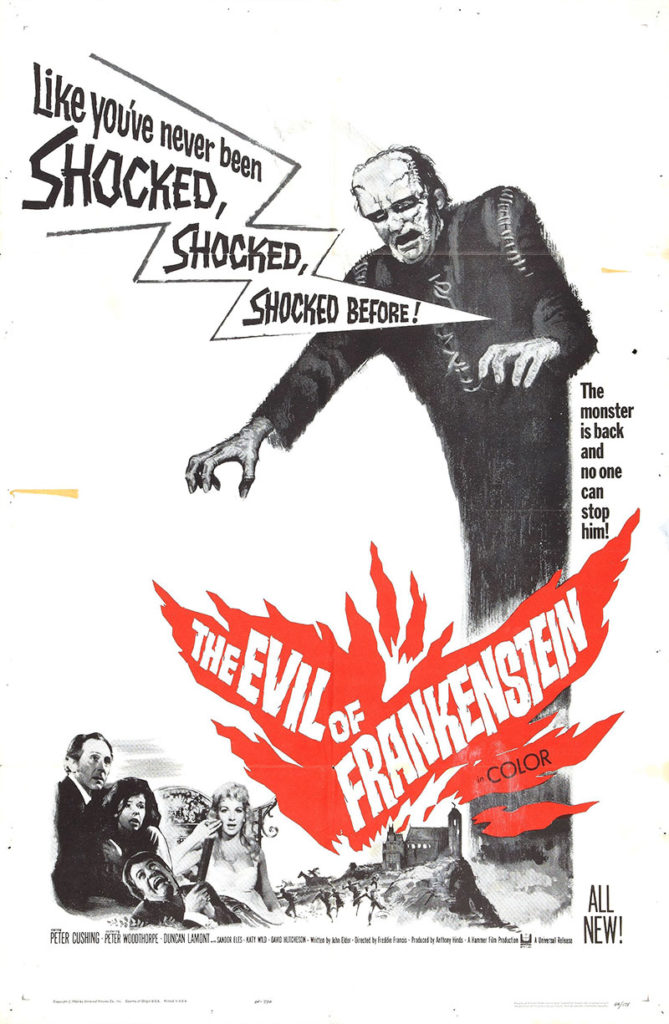Hammer had a good thing going with its Frankenstein films. Because Universal Pictures were being stingy with their trademarks, Hammer had been forced to deviate from Universal’s Frankenstein flicks in setting and characterizations. This freed Hammer’s creative teams to come up with some pretty imaginative stuff, and also allowed the films’ star, Peter Cushing, to make the character of Victor Frankenstein his own. But, Hammer and Universal ironed out their differences in the form of a distribution deal, and Hammer wasted no time bringing their Frankenstein into line with Universal’s. That’s too bad.
The Evil of Frankenstein is not a sequel to The Revenge of Frankenstein. To prove that there is nothing new under the sun, Evil is a reboot of Hammer’s Frankenstein films. It doesn’t start things over from the beginning, but the evil Baron Frankenstein’s actions from the previous two films have been retconned. In this new telling, Frankenstein wasn’t arrested and imprisoned for murder. He didn’t escape execution and set up a medical practice under a false name, and he didn’t have his brain...whoops, almost spoiled the ending of the previous film. Anyway, everything that happened before is now expunged.
In an extended flashback, Frankenstein is shown to have created a monster, but rather than be arrested for murder, he is expelled from his home in Karlstaad for crimes against God, but he was never in any danger of execution. In this film, his creation was not some murderous beast but merely a misunderstood beast.  At one point, Frankenstein even utters the words, “Why can’t they leave me alone?” If this film had been following the previous continuity, that would be easy to answer — he’s a killer. But Frankenstein’s morality is less in question in this film.
At one point, Frankenstein even utters the words, “Why can’t they leave me alone?” If this film had been following the previous continuity, that would be easy to answer — he’s a killer. But Frankenstein’s morality is less in question in this film.
Frankenstein and his assistant, Hans (Sandor Elès), have returned to Karlstaad because Frankenstein needs money. His plan is to sell off the invaluable possessions in his family chateau to finance further experiments. But he discovers that the local authorities looted his estate after they exiled him. That’s too bad, but they were nice enough to leave his laboratory intact, their greedy little fingers only concerned with baubles.
Frankenstein as played by Cushing isn’t the most reasonable of persons, and he ends up drawing the ire of the town’s authorities yet again, forcing him to flee to the mountains. There, he finds the body of the monster he had created years before preserved in a block of ice, and decides to thaw him out, return to the chateau, and bring the monster back to life…again. Predictable results follow.
I do not feel it was a good idea for Hammer to throw away its own Frankenstein continuity, but only from a creative standpoint. I’m sure that it made financial sense to ape Universal’s pictures because it created a greater potential return on investment in the American market. I wouldn’t be surprised if part of the conditions for the distribution deal with Universal required the changes. So, while screenwriter Anthony Hinds was constrained in what he could write, his story is just fine. This is a good Frankenstein story, and director Freddie Francis (who had already won his first of two Oscars for cinematography), did a decent enough job with the material.
My biggest problem with this film is the monster. Played by professional wrestler Ernie ‘Kiwi’ Kingston, the monster is a study in what not to do with makeup. I haven’t seen a makeup job this poor since the first Hammer Frankenstein movie I reviewed earlier this month. Check that. This might be the worst makeup job I’ve ever seen in any movie. It looks like the monster fell face first into a Tupperware container full of clay. How is a viewer supposed to take this movie seriously when the filmmakers seemed to have thrown together the creature at the last moment? And Kiwi Kingston didn’t require all the prosthetic work. He wasn’t ugly, but he had one tough looking mug. The makeup is a befuddling choice by the filmmakers. Get past it, though, and The Evil of Frankenstein is a decent entry in Hammer’s horror oeuvre, though I can’t help feeling they were capable of more.
